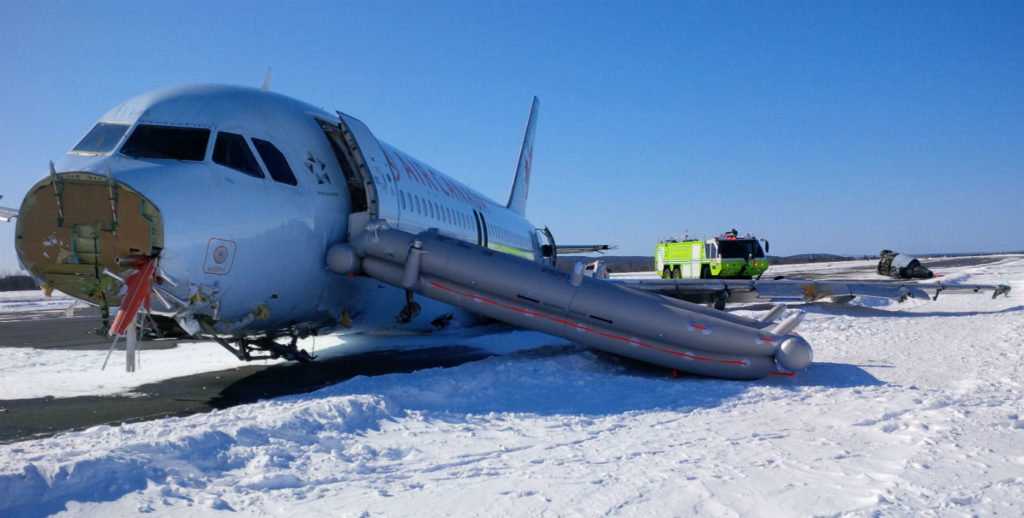Estimated reading time 3 minutes, 58 seconds.
A Nova Scotia Appeal Court judge has ruled that the Transportation Safety Board of Canada (TSB) does not have to hand over voice recordings or transcripts from Air Canada Flight 624, which crashed at Halifax Stanfield International Airport — at least not yet.

Flight 624 from Toronto, with a crew of five and 133 passengers on board, was on a non-precision approach at 12:30 a.m. March 29, 2015. The TSB report found that the Airbus A320 “severed power lines, then struck the snow-covered ground about 740 feet before the runway threshold.” It “continued airborne through the localizer antenna array, then struck the ground twice more before sliding along the runway,” coming to rest “about 1,900 feet beyond the threshold.” There no was fire but the Airbus was a write-off.
Twenty-five passengers required hospital treatment and three passengers filed a class-action lawsuit, seeking compensation for physical and/or psychological injury. Their lawyers had argued that the cockpit voice recorder (CVR) data was central to the case.
The TSB had countered that its governing legislation, the Canadian Transportation Accident Investigation and Safety Board Act, precludes it from releasing the data, which it used to compile its accident report. Section 28 of the Act states, among other things, that “every on-board recording is privileged” and essentially prohibits its communication “in any legal, disciplinary or other proceedings.”
But late last year, Nova Scotia Supreme Court judge Patrick Duncan ordered the TSB to provide the recordings and any transcripts, ruling that the definition of “privilege” is limited. “The necessary implication is that the TSB can, subject to statute, communicate contents that are related to the causes or the identification of safety deficiencies . . . In the circumstances of this case, the public interest in the administration of justice outweighs the importance attached to the statutory privilege protecting the cockpit voice recorder.”
The TSB challenged that order, seeking a stay pending a further appeal, which is scheduled for June 9. The stay was granted on Feb. 6 by Justice Carole Beaton of the appeal court. In her written reasons, which were published March 11, she explained that a primary consideration was whether the TSB would “suffer irreparable harm” if the motion was not stayed.
“Should the stay not be granted (assuming the appeal is ultimately successful); and, the appellant will suffer greater harm if the stay is not granted than the respondent if the stay is granted.”
She cited an affidavit by Jean Laporte, a retired chief operating officer of the TSB, to the effect that releasing the recordings before the appeal is heard and ruled upon could compromise future TSB investigations. Potential witnesses such as pilots might avoid having “certain conversations in the cockpit” because of the chance they could become public.
Laporte, who retired in September 2019, said the data are effectively already in the hands of the litigants “by virtue of the TSB’s report on the Flight 624 crash.”
Justice Beaton said Laporte felt that enabled the litigants “to reconstruct in detail both the flight and events in the cockpit, without need for the CVR.”








